七下 unit 2 What time do you go to school? 单元复习课件(共36张PPT)
文档属性
| 名称 | 七下 unit 2 What time do you go to school? 单元复习课件(共36张PPT) |  | |
| 格式 | zip | ||
| 文件大小 | 583.1KB | ||
| 资源类型 | 教案 | ||
| 版本资源 | 人教新目标(Go for it)版 | ||
| 科目 | 英语 | ||
| 更新时间 | 2023-04-10 16:57:59 | ||
图片预览

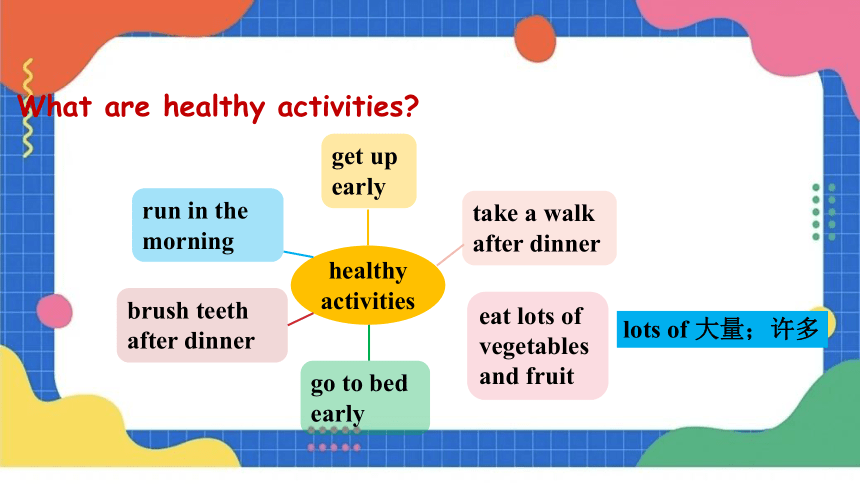
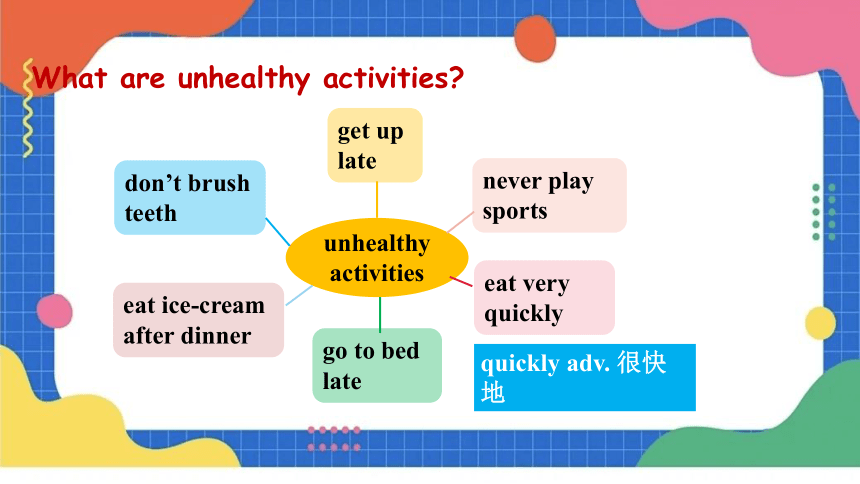
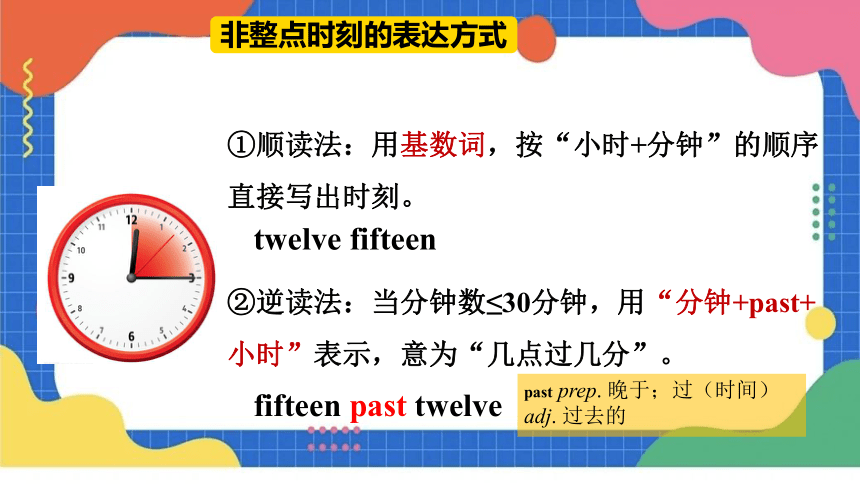
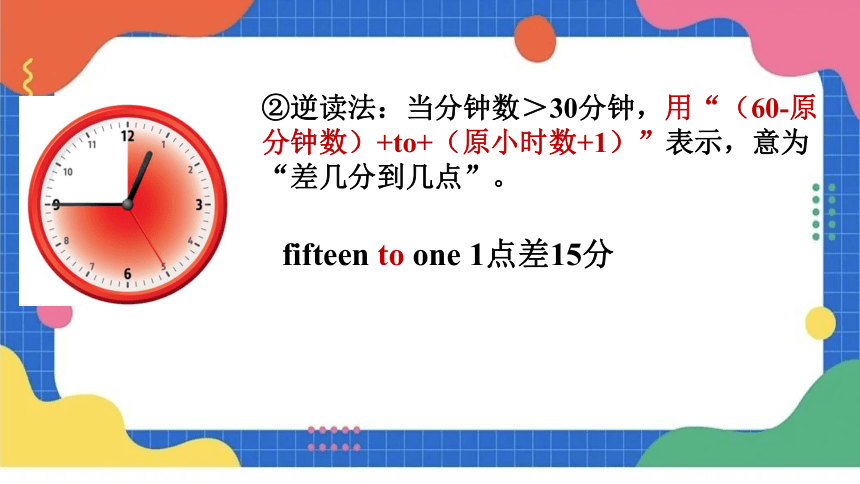
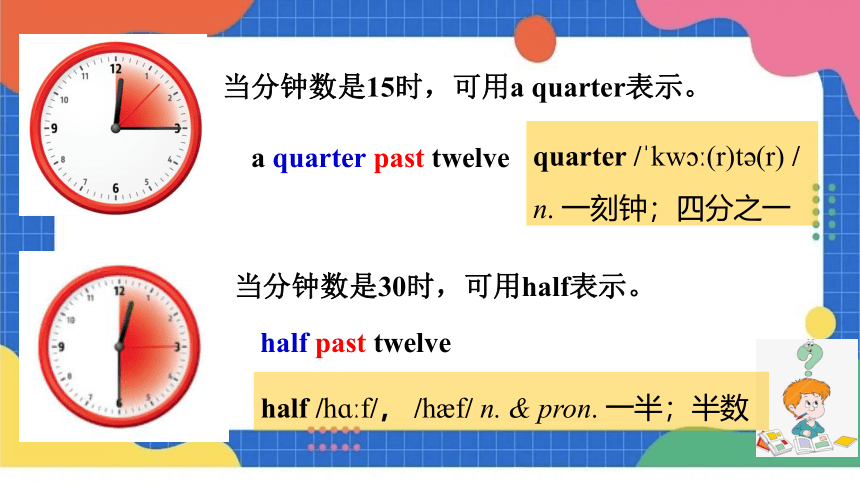
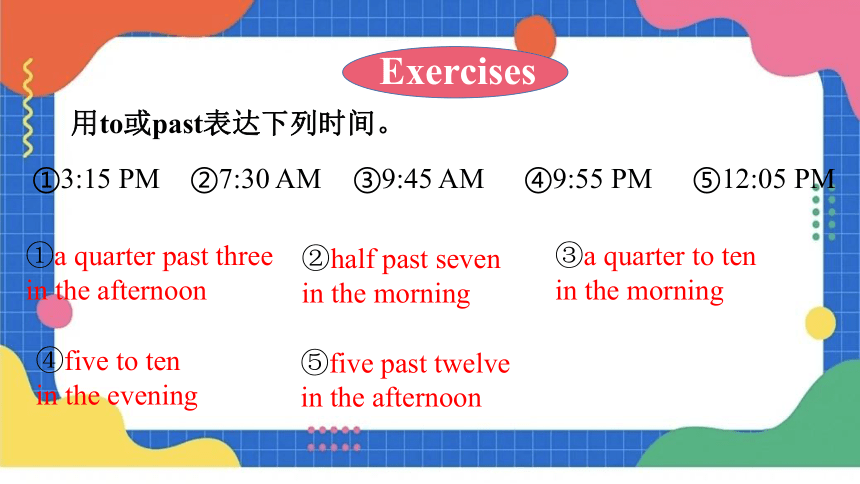
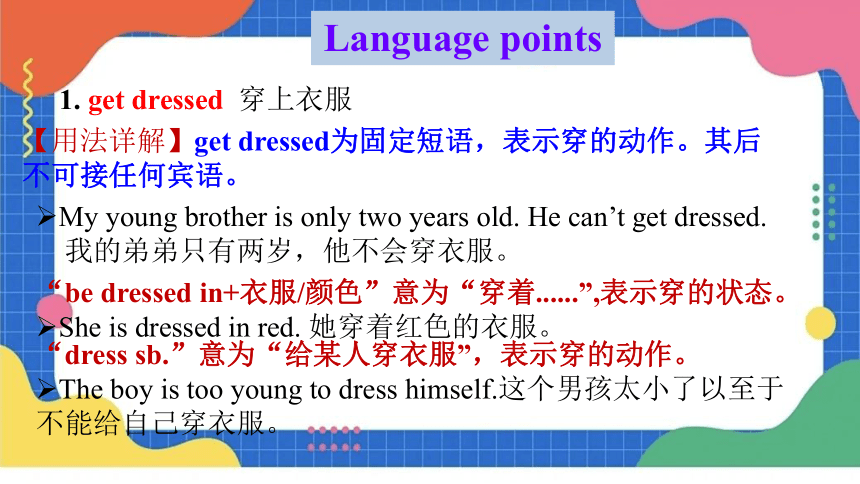
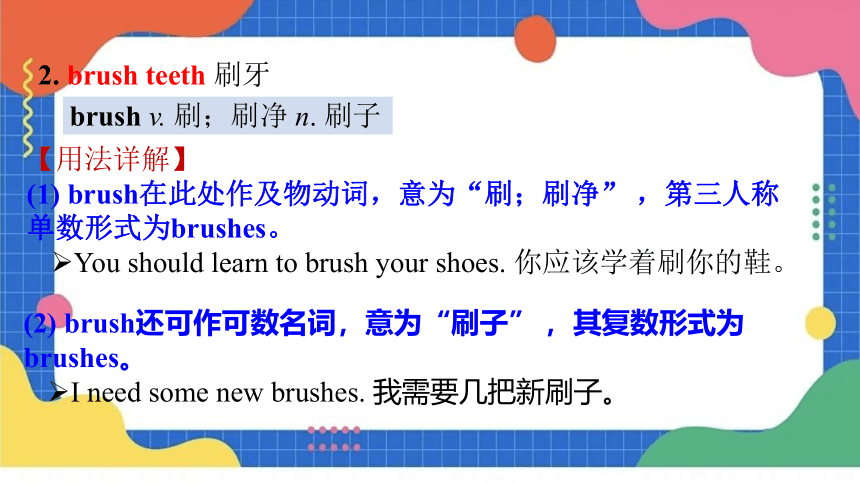
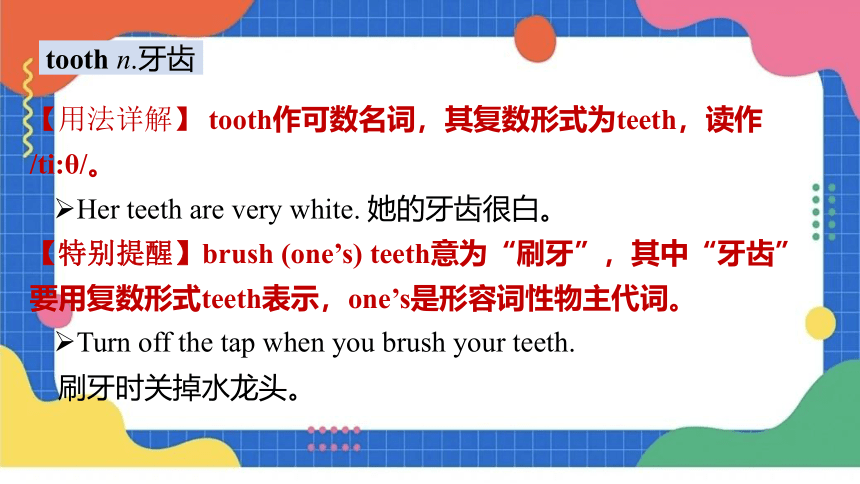
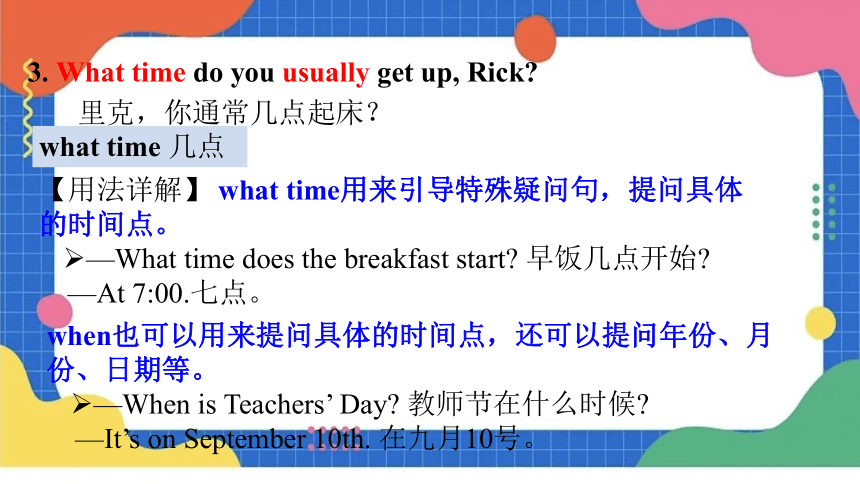
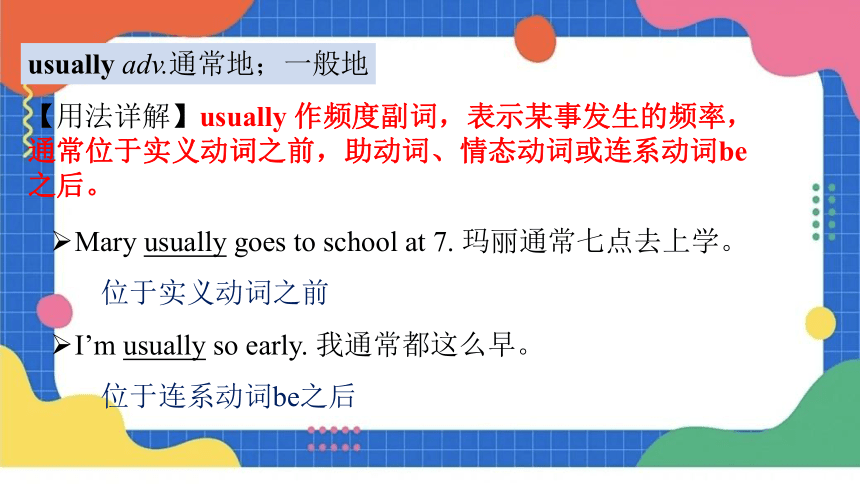
文档简介
(共36张PPT)
单元复习课件
Unit 2
What time do you go to school
What are healthy activities
healthy activities
get up early
go to bed early
run in the morning
take a walk after dinner
brush teeth after dinner
eat lots of vegetables and fruit
lots of 大量;许多
unhealthy activities
get up late
go to bed late
don’t brush teeth
never play sports
eat ice-cream after dinner
eat very quickly
quickly adv. 很快地
What are unhealthy activities
①顺读法:用基数词,按“小时+分钟”的顺序直接写出时刻。
②逆读法:当分钟数≤30分钟,用“分钟+past+小时”表示,意为“几点过几分”。
past prep. 晚于;过(时间) adj. 过去的
fifteen past twelve
非整点时刻的表达方式
twelve fifteen
fifteen to one 1点差15分
②逆读法:当分钟数>30分钟,用“(60-原分钟数)+to+(原小时数+1)”表示,意为“差几分到几点”。
quarter / kw (r)t (r) /
n. 一刻钟;四分之一
a quarter past twelve
当分钟数是15时,可用a quarter表示。
half /hɑ f/, /h f/ n. & pron. 一半;半数
half past twelve
当分钟数是30时,可用half表示。
Exercises
用to或past表达下列时间。
①3:15 PM
②7:30 AM
③9:45 AM
④9:55 PM
⑤12:05 PM
①a quarter past three
in the afternoon
②half past seven
in the morning
③a quarter to ten
in the morning
④five to ten
in the evening
⑤five past twelve
in the afternoon
Language points
【用法详解】get dressed为固定短语,表示穿的动作。其后不可接任何宾语。
1. get dressed 穿上衣服
“be dressed in+衣服/颜色”意为“穿着......”,表示穿的状态。
She is dressed in red. 她穿着红色的衣服。
My young brother is only two years old. He can’t get dressed.
我的弟弟只有两岁,他不会穿衣服。
“dress sb.”意为“给某人穿衣服”,表示穿的动作。
The boy is too young to dress himself.这个男孩太小了以至于不能给自己穿衣服。
2. brush teeth 刷牙
brush v. 刷;刷净 n. 刷子
【用法详解】
(1) brush在此处作及物动词,意为“刷;刷净” ,第三人称单数形式为brushes。
You should learn to brush your shoes. 你应该学着刷你的鞋。
(2) brush还可作可数名词,意为“刷子” ,其复数形式为brushes。
I need some new brushes. 我需要几把新刷子。
tooth n.牙齿
【用法详解】 tooth作可数名词,其复数形式为teeth,读作/ti:θ/。
Her teeth are very white. 她的牙齿很白。
【特别提醒】brush (one’s) teeth意为“刷牙”,其中“牙齿”要用复数形式teeth表示,one’s是形容词性物主代词。
Turn off the tap when you brush your teeth.
刷牙时关掉水龙头。
3. What time do you usually get up, Rick
里克,你通常几点起床?
what time 几点
【用法详解】 what time用来引导特殊疑问句,提问具体的时间点。
—What time does the breakfast start 早饭几点开始
—At 7:00.七点。
when也可以用来提问具体的时间点,还可以提问年份、月份、日期等。
—When is Teachers’ Day 教师节在什么时候
—It’s on September 10th. 在九月10号。
usually adv.通常地;一般地
【用法详解】usually 作频度副词,表示某事发生的频率,通常位于实义动词之前,助动词、情态动词或连系动词be之后。
Mary usually goes to school at 7. 玛丽通常七点去上学。
位于实义动词之前
I’m usually so early. 我通常都这么早。
位于连系动词be之后
4. I usually get up at six thirty. 我通常六点半起床。
【用法详解】at 作介词,在此表示时间,其后一般接表示具体钟点的词,也可用于某些固定短语中。
at 9:00 在9点钟
at night 在夜晚
at noon 在中午
【拓展延伸】
on + 具体日期/特定某一天/星期...
on Sunday/on my birthday/on the morning of Friday...
in + 年份/ 月份/时间段/季节...
in winter/in 2020/in the morning...
Exercises
Ⅰ.用所给单词的适当形式填空。
1. Linda ________ (take) a shower at six thirty.
2. An hour has _______ (six) minutes.
3. My brother always _________ (brush) teeth at
9:00 at night.
takes
sixty
brushes
Ⅱ.根据汉语提示完成句子。
1. —______________________________ 几点了?
—It’s _________ o’clock. 12点了。
2. —____________________ do you go home 你几点回家?
—I ___________ 7 _________. 我7点回家。
3. —What time ______ Tom ______ in the morning
汤姆早上几点跑步?
—Tom ______ ______ 6:30 in the morning.
汤姆在早上6: 30跑步。
What time is it/What's the time
twelve
What time /When
go home at
o’clock
does run
runs at
1. I never get up so early. 我从来不这么早起床。
【用法详解】never作副词,表示某事发生的频率为零,通常位于实义动词之前,情态动词、连系动词或助动词之后。
I never know such a person. 我从不知道这样一个人。
He is never late for school. 他上学从不迟到。
never adv. 从不;绝不
【用法详解】early在此处作副词,多放于被修饰词之后,意为“早”。此外,early 还可作形容词,多放于被修饰词之前,意为“早的”。
Could you come back home early this evening
今天晚上你能早点回家吗?
I like the early morning sunshine. 我喜欢清晨的阳光。
early adv.& adj. 早(的)
作副词,修饰come back
作形容词,修饰morning sunshine
【用法详解】job作可数名词,指具体的职业或工作。
She wants to find a job in Shanghai. 她想在上海找一份工作。
【拓展延伸】“Good job!” 常用于口语中,意为“干得好!”,常用来赞扬对方。
—Mom, I finish cleaning my room. 妈妈,我打扫完我的房间了。
—Good job! 干得好!
job n. 工作; 职业
2. Scott has an interesting job. 斯科特有一份有趣的工作。
3. He works at a radio station. 他在一家广播电台工作。
【用法详解】
(1) work在此作不及物动词,意为“工作”。worker 是名词,意为“工人”。
Do you work in a school 你在学校工作吗?
(2)work还可作不可数名词,意为“工作” ,指人们在日常生活和工作中从事的体力或脑力劳动,即各类工作。at work表示“在工作”。
Please keep quiet. Your father is at work.请保持安静。你爸爸正在工作。
work v. & n.工作
【易混辨析】work与job
work 不可数名词 泛指抽象意义的工作。
job 可数名词 指具体的某种工作或职业。
e.g. My brother has a job(n. ). He is a worker(n. ) and works(v. ) in a factory. He likes his work(n. ) very much.
我哥哥有一份工作。他是一名工人,在一家工厂工作。他非常喜欢他的工作。
4. After that, I usually exercise at about ten twenty.
在那之后,我通常十点二十左右锻炼身体。
【用法详解】exercise在此处作动词,意为“锻炼”。
My grandparents exercise every day. 我的爷爷奶奶天天锻炼身体。
【拓展延伸】exercise还可作名词,常见用法如下:
exercise n.
不可数名词
可数名词
表示“锻炼;运动”,常和take, do, get等词连用
表示“一套动作”或“练习,习题”,如do morning exercises做早操
exercise v.& n.锻炼;练习
Exercises
一、根据句意及首字母或汉语提示完成单词。
1.N cross the road when the traffic light is red.
2.My house is far from the workplace, so I usually get up very e .
3.It’s a good habit to brush your ______(牙齿) after a meal.
4.My _______(工作) is taking care of the baby.
5.Can you tell a _______ (滑稽好笑的) story to make us laugh
ever
funny
teeth
job
arly
二、用所给单词的适当形式填空。
1.I _______(usual) go to school by bike.
2.They always get _______(dress) at seven o’clock.
3.Susan never _______(work) on weekends.
4.The old man ________(exercise) every morning.
5.I usually_______(take) a shower before breakfast.
usually
dressed
works
exercises
take
After school, I sometimes play basketball for half an hour.
放学后,我有时打半个小时的篮球。
sometimes adv.有时
【用法详解】sometimes为频度副词,意为“有时”,与from time to time或at times同义,常与一般现在时连用。
I sometimes go to the cinema with my mother.
我有时和我妈妈一起去看电影。
【易混辨析】 sometimes, sometime, some times与some time
sometimes 有时 频度副词 表示事情发生的频率,对其提问要用how often。
sometime 某个时候 副词 (有时写作some time )指将来或过去某个不确切的时间, 对其提问要用when。
some times 几次;几回 名词短语 time为可数名词,表示“次;回”,对其提问要用how many times。
some time 一段时间 名词短语 time为不可数名词,表示“时间”,对其提问要用how long。
2. In the evening, I either watch TV or play computer games.
晚上我要么看电视,要么玩电脑游戏。
either...or... 要么……要么……;或者……或者……
【用法详解】either… or...连接句中两个独立的词、短语或句子,表示一种选择。其中either作连词,意为“或者”。
You can have either the apple or the banana.
你可以吃苹果,也可以吃香蕉。
I think the key is either in my bag or on the table.
我想钥匙不是在我包里就是在桌上。
【拓展延伸】
either还可作副词,意为“也”,用在否定句的末尾。
Peter can’t go and I can’t either. 彼得不能去,我也不能。
【特别提醒】either... or...连接两个名词或代词作主语时,谓语动词应该与离其最近的那个名词或代词在人称和数上保持一致,也就是遵循“ 就近原则”。
Either you or your sister has to stay at home. 要么你,要么你妹妹必须待在家里。
与your sister(保持数的一致)
3. She knows it’s not good for her, but it tastes good!
她知道这对她不好,但它(冰激凌)好吃啊!
be good for 对……有好处
【用法详解】be good for为固定短语,其反义短语为be bad for(对......有害)。
Reading is good for your writing. 阅读对你的写作有益。
Watching too much TV is bad for your eyes. 看太多电视对你的眼睛不好。
taste v.有……的味道;品尝 n.味道;滋味
【用法详解】
(1)taste在句中作连系动词,意为“有......的味道”,其后接形容词作表语。
The soup tastes delicious. 这汤尝起来很美味。
(2)taste也可作实义动词,意为“品尝”。
You can taste these dishes. 你可以尝尝这些菜。
(3)taste还可作名词,意为“味道;滋味”。
The medicine has a sweet taste. 这药有一种甜甜的味道。
【拓展延伸】
taste作名词,还可意为“品味;欣赏力”。
He has very good taste in music. 他有很高的音乐欣赏力。
4. I have a very healthy life. 我过着非常健康的生活。
healthy adj. 健康的
【用法详解】
healthy的反义词为unhealthy(不健康的)。
keep healthy意为“保持健康”。
We should eat more healthy food to keep healthy.
我们应该多吃健康食品来保持健康。
【拓展延伸】health作不可数名词,意为“健康”。
be in good/poor health意为“健康状况良好/不好”。
My grandpa is in poor health. 我爷爷健康状况不好。
life n. 生活;生命
【用法详解】
(1)life在此处作名词,意为“生活”,have/live a(n)...life意为“过着……的生活”。
Now, we Chinese have/live a happy life.
现在,我们中国人过着幸福的生活。
(2)life作名词时,还可意为“生命;一生”,in one’s life 意为“在某人的一生中”。
My parents are the most important people in my life.
父母是我一生中最重要的人。
【用法详解】本句是倒装句,即谓语在主语之前,正常语序为“Your clothes are here.”。当here, there等位于句首且主语为名词时,句子要用倒装语序,谓语动词应与后面的主语在数上保持一致。
Here rings the bell. 铃响了。
5. Here are your clothes. 这是你的衣服。
倒装句
【拓展延伸】以here或there开头的句子,如果主语是人称代词,则句子不倒装。
Here you are. 给你。
Here he comes. 他来了。
Exercises
一、单项选择。
1.The cake _______ delicious. I’d like to have another one.
A. tastes B. looks C. sounds D. feels
2.______ I go shopping with my mother.
A. Some time B. Sometimes C. Some times D. Sometime
3.—How do you like the two pairs of shoes
—They don’t fit me. They are ______ too big ______ too small.
A. not only; but also B. neither; nor
C. either; or D.either; and
B
A
C
二、根据汉语意思完成句子,每空一词。
1.我通常在周末去图书馆。
I usually go to the library______ ________.
2.教学楼前有许多学生。
There are ______ ______ students in front of the classroom building.
3.读书对你的学习有益。
Reading ______ ______ _______ your learning.
on weekends
lots of
is good for
4.他弟弟起床很晚,所以他没吃早餐,匆匆去上学了。
His brother gets up very _____, so he doesn’t have breakfast and goes to school ______.
5.我弟弟在下午做家庭作业。
My brother ______ ______ __________ in the afternoon.
late
quickly
does his homework
单元复习课件
Unit 2
What time do you go to school
What are healthy activities
healthy activities
get up early
go to bed early
run in the morning
take a walk after dinner
brush teeth after dinner
eat lots of vegetables and fruit
lots of 大量;许多
unhealthy activities
get up late
go to bed late
don’t brush teeth
never play sports
eat ice-cream after dinner
eat very quickly
quickly adv. 很快地
What are unhealthy activities
①顺读法:用基数词,按“小时+分钟”的顺序直接写出时刻。
②逆读法:当分钟数≤30分钟,用“分钟+past+小时”表示,意为“几点过几分”。
past prep. 晚于;过(时间) adj. 过去的
fifteen past twelve
非整点时刻的表达方式
twelve fifteen
fifteen to one 1点差15分
②逆读法:当分钟数>30分钟,用“(60-原分钟数)+to+(原小时数+1)”表示,意为“差几分到几点”。
quarter / kw (r)t (r) /
n. 一刻钟;四分之一
a quarter past twelve
当分钟数是15时,可用a quarter表示。
half /hɑ f/, /h f/ n. & pron. 一半;半数
half past twelve
当分钟数是30时,可用half表示。
Exercises
用to或past表达下列时间。
①3:15 PM
②7:30 AM
③9:45 AM
④9:55 PM
⑤12:05 PM
①a quarter past three
in the afternoon
②half past seven
in the morning
③a quarter to ten
in the morning
④five to ten
in the evening
⑤five past twelve
in the afternoon
Language points
【用法详解】get dressed为固定短语,表示穿的动作。其后不可接任何宾语。
1. get dressed 穿上衣服
“be dressed in+衣服/颜色”意为“穿着......”,表示穿的状态。
She is dressed in red. 她穿着红色的衣服。
My young brother is only two years old. He can’t get dressed.
我的弟弟只有两岁,他不会穿衣服。
“dress sb.”意为“给某人穿衣服”,表示穿的动作。
The boy is too young to dress himself.这个男孩太小了以至于不能给自己穿衣服。
2. brush teeth 刷牙
brush v. 刷;刷净 n. 刷子
【用法详解】
(1) brush在此处作及物动词,意为“刷;刷净” ,第三人称单数形式为brushes。
You should learn to brush your shoes. 你应该学着刷你的鞋。
(2) brush还可作可数名词,意为“刷子” ,其复数形式为brushes。
I need some new brushes. 我需要几把新刷子。
tooth n.牙齿
【用法详解】 tooth作可数名词,其复数形式为teeth,读作/ti:θ/。
Her teeth are very white. 她的牙齿很白。
【特别提醒】brush (one’s) teeth意为“刷牙”,其中“牙齿”要用复数形式teeth表示,one’s是形容词性物主代词。
Turn off the tap when you brush your teeth.
刷牙时关掉水龙头。
3. What time do you usually get up, Rick
里克,你通常几点起床?
what time 几点
【用法详解】 what time用来引导特殊疑问句,提问具体的时间点。
—What time does the breakfast start 早饭几点开始
—At 7:00.七点。
when也可以用来提问具体的时间点,还可以提问年份、月份、日期等。
—When is Teachers’ Day 教师节在什么时候
—It’s on September 10th. 在九月10号。
usually adv.通常地;一般地
【用法详解】usually 作频度副词,表示某事发生的频率,通常位于实义动词之前,助动词、情态动词或连系动词be之后。
Mary usually goes to school at 7. 玛丽通常七点去上学。
位于实义动词之前
I’m usually so early. 我通常都这么早。
位于连系动词be之后
4. I usually get up at six thirty. 我通常六点半起床。
【用法详解】at 作介词,在此表示时间,其后一般接表示具体钟点的词,也可用于某些固定短语中。
at 9:00 在9点钟
at night 在夜晚
at noon 在中午
【拓展延伸】
on + 具体日期/特定某一天/星期...
on Sunday/on my birthday/on the morning of Friday...
in + 年份/ 月份/时间段/季节...
in winter/in 2020/in the morning...
Exercises
Ⅰ.用所给单词的适当形式填空。
1. Linda ________ (take) a shower at six thirty.
2. An hour has _______ (six) minutes.
3. My brother always _________ (brush) teeth at
9:00 at night.
takes
sixty
brushes
Ⅱ.根据汉语提示完成句子。
1. —______________________________ 几点了?
—It’s _________ o’clock. 12点了。
2. —____________________ do you go home 你几点回家?
—I ___________ 7 _________. 我7点回家。
3. —What time ______ Tom ______ in the morning
汤姆早上几点跑步?
—Tom ______ ______ 6:30 in the morning.
汤姆在早上6: 30跑步。
What time is it/What's the time
twelve
What time /When
go home at
o’clock
does run
runs at
1. I never get up so early. 我从来不这么早起床。
【用法详解】never作副词,表示某事发生的频率为零,通常位于实义动词之前,情态动词、连系动词或助动词之后。
I never know such a person. 我从不知道这样一个人。
He is never late for school. 他上学从不迟到。
never adv. 从不;绝不
【用法详解】early在此处作副词,多放于被修饰词之后,意为“早”。此外,early 还可作形容词,多放于被修饰词之前,意为“早的”。
Could you come back home early this evening
今天晚上你能早点回家吗?
I like the early morning sunshine. 我喜欢清晨的阳光。
early adv.& adj. 早(的)
作副词,修饰come back
作形容词,修饰morning sunshine
【用法详解】job作可数名词,指具体的职业或工作。
She wants to find a job in Shanghai. 她想在上海找一份工作。
【拓展延伸】“Good job!” 常用于口语中,意为“干得好!”,常用来赞扬对方。
—Mom, I finish cleaning my room. 妈妈,我打扫完我的房间了。
—Good job! 干得好!
job n. 工作; 职业
2. Scott has an interesting job. 斯科特有一份有趣的工作。
3. He works at a radio station. 他在一家广播电台工作。
【用法详解】
(1) work在此作不及物动词,意为“工作”。worker 是名词,意为“工人”。
Do you work in a school 你在学校工作吗?
(2)work还可作不可数名词,意为“工作” ,指人们在日常生活和工作中从事的体力或脑力劳动,即各类工作。at work表示“在工作”。
Please keep quiet. Your father is at work.请保持安静。你爸爸正在工作。
work v. & n.工作
【易混辨析】work与job
work 不可数名词 泛指抽象意义的工作。
job 可数名词 指具体的某种工作或职业。
e.g. My brother has a job(n. ). He is a worker(n. ) and works(v. ) in a factory. He likes his work(n. ) very much.
我哥哥有一份工作。他是一名工人,在一家工厂工作。他非常喜欢他的工作。
4. After that, I usually exercise at about ten twenty.
在那之后,我通常十点二十左右锻炼身体。
【用法详解】exercise在此处作动词,意为“锻炼”。
My grandparents exercise every day. 我的爷爷奶奶天天锻炼身体。
【拓展延伸】exercise还可作名词,常见用法如下:
exercise n.
不可数名词
可数名词
表示“锻炼;运动”,常和take, do, get等词连用
表示“一套动作”或“练习,习题”,如do morning exercises做早操
exercise v.& n.锻炼;练习
Exercises
一、根据句意及首字母或汉语提示完成单词。
1.N cross the road when the traffic light is red.
2.My house is far from the workplace, so I usually get up very e .
3.It’s a good habit to brush your ______(牙齿) after a meal.
4.My _______(工作) is taking care of the baby.
5.Can you tell a _______ (滑稽好笑的) story to make us laugh
ever
funny
teeth
job
arly
二、用所给单词的适当形式填空。
1.I _______(usual) go to school by bike.
2.They always get _______(dress) at seven o’clock.
3.Susan never _______(work) on weekends.
4.The old man ________(exercise) every morning.
5.I usually_______(take) a shower before breakfast.
usually
dressed
works
exercises
take
After school, I sometimes play basketball for half an hour.
放学后,我有时打半个小时的篮球。
sometimes adv.有时
【用法详解】sometimes为频度副词,意为“有时”,与from time to time或at times同义,常与一般现在时连用。
I sometimes go to the cinema with my mother.
我有时和我妈妈一起去看电影。
【易混辨析】 sometimes, sometime, some times与some time
sometimes 有时 频度副词 表示事情发生的频率,对其提问要用how often。
sometime 某个时候 副词 (有时写作some time )指将来或过去某个不确切的时间, 对其提问要用when。
some times 几次;几回 名词短语 time为可数名词,表示“次;回”,对其提问要用how many times。
some time 一段时间 名词短语 time为不可数名词,表示“时间”,对其提问要用how long。
2. In the evening, I either watch TV or play computer games.
晚上我要么看电视,要么玩电脑游戏。
either...or... 要么……要么……;或者……或者……
【用法详解】either… or...连接句中两个独立的词、短语或句子,表示一种选择。其中either作连词,意为“或者”。
You can have either the apple or the banana.
你可以吃苹果,也可以吃香蕉。
I think the key is either in my bag or on the table.
我想钥匙不是在我包里就是在桌上。
【拓展延伸】
either还可作副词,意为“也”,用在否定句的末尾。
Peter can’t go and I can’t either. 彼得不能去,我也不能。
【特别提醒】either... or...连接两个名词或代词作主语时,谓语动词应该与离其最近的那个名词或代词在人称和数上保持一致,也就是遵循“ 就近原则”。
Either you or your sister has to stay at home. 要么你,要么你妹妹必须待在家里。
与your sister(保持数的一致)
3. She knows it’s not good for her, but it tastes good!
她知道这对她不好,但它(冰激凌)好吃啊!
be good for 对……有好处
【用法详解】be good for为固定短语,其反义短语为be bad for(对......有害)。
Reading is good for your writing. 阅读对你的写作有益。
Watching too much TV is bad for your eyes. 看太多电视对你的眼睛不好。
taste v.有……的味道;品尝 n.味道;滋味
【用法详解】
(1)taste在句中作连系动词,意为“有......的味道”,其后接形容词作表语。
The soup tastes delicious. 这汤尝起来很美味。
(2)taste也可作实义动词,意为“品尝”。
You can taste these dishes. 你可以尝尝这些菜。
(3)taste还可作名词,意为“味道;滋味”。
The medicine has a sweet taste. 这药有一种甜甜的味道。
【拓展延伸】
taste作名词,还可意为“品味;欣赏力”。
He has very good taste in music. 他有很高的音乐欣赏力。
4. I have a very healthy life. 我过着非常健康的生活。
healthy adj. 健康的
【用法详解】
healthy的反义词为unhealthy(不健康的)。
keep healthy意为“保持健康”。
We should eat more healthy food to keep healthy.
我们应该多吃健康食品来保持健康。
【拓展延伸】health作不可数名词,意为“健康”。
be in good/poor health意为“健康状况良好/不好”。
My grandpa is in poor health. 我爷爷健康状况不好。
life n. 生活;生命
【用法详解】
(1)life在此处作名词,意为“生活”,have/live a(n)...life意为“过着……的生活”。
Now, we Chinese have/live a happy life.
现在,我们中国人过着幸福的生活。
(2)life作名词时,还可意为“生命;一生”,in one’s life 意为“在某人的一生中”。
My parents are the most important people in my life.
父母是我一生中最重要的人。
【用法详解】本句是倒装句,即谓语在主语之前,正常语序为“Your clothes are here.”。当here, there等位于句首且主语为名词时,句子要用倒装语序,谓语动词应与后面的主语在数上保持一致。
Here rings the bell. 铃响了。
5. Here are your clothes. 这是你的衣服。
倒装句
【拓展延伸】以here或there开头的句子,如果主语是人称代词,则句子不倒装。
Here you are. 给你。
Here he comes. 他来了。
Exercises
一、单项选择。
1.The cake _______ delicious. I’d like to have another one.
A. tastes B. looks C. sounds D. feels
2.______ I go shopping with my mother.
A. Some time B. Sometimes C. Some times D. Sometime
3.—How do you like the two pairs of shoes
—They don’t fit me. They are ______ too big ______ too small.
A. not only; but also B. neither; nor
C. either; or D.either; and
B
A
C
二、根据汉语意思完成句子,每空一词。
1.我通常在周末去图书馆。
I usually go to the library______ ________.
2.教学楼前有许多学生。
There are ______ ______ students in front of the classroom building.
3.读书对你的学习有益。
Reading ______ ______ _______ your learning.
on weekends
lots of
is good for
4.他弟弟起床很晚,所以他没吃早餐,匆匆去上学了。
His brother gets up very _____, so he doesn’t have breakfast and goes to school ______.
5.我弟弟在下午做家庭作业。
My brother ______ ______ __________ in the afternoon.
late
quickly
does his homework
同课章节目录
- Unit 1 Can you play the guitar?
- Section A
- Section B
- Unit 2 What time do you go to school?
- Section A
- Section B
- Unit 3 How do you get to school?
- Section A
- Section B
- Unit 4 Don't eat in class.
- Section A
- Section B
- Unit 5 Why do you like pandas?
- Section A
- Section B
- Unit 6 I'm watching TV.
- Section A
- Section B
- Review of Units 1-6
- Unit 7 It's raining!
- Section A
- Section B
- Unit 8 Is there a post office near here?
- Section A
- Section B
- Unit 9 What does he look like?
- Section A
- Section B
- Unit 10 I'd like some noodles.
- Section A
- Section B
- Unit 11 How was your school trip?
- Section A
- Section B
- Unit 12 What did you do last weekend?
- Section A
- Section B
